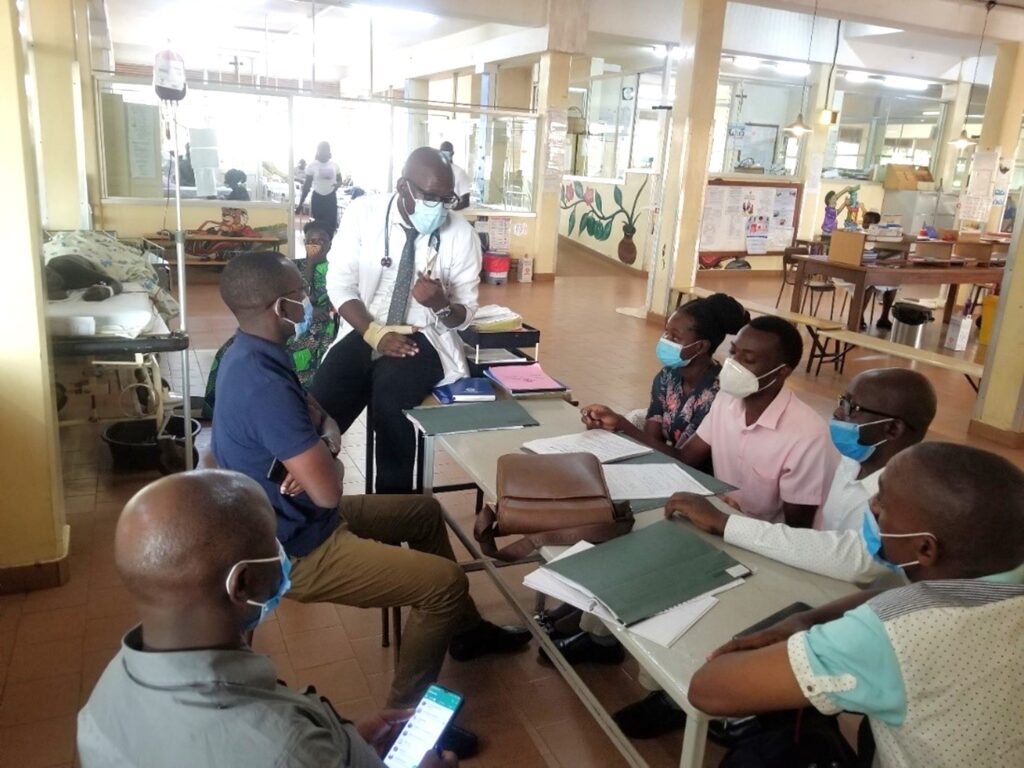Building Accountability and Excellence in Uganda’s Hospitals through Hand Hygiene
Building Accountability and Excellence in Uganda’s Hospitals through Hand Hygiene

Health care-associated infections (HAIs) and antimicrobial resistance (AMR) are critical public health challenges in Uganda, where more than 15% of patients are at risk of contracting infections during a hospital stay. Poor hand hygiene compliance—as low as 10% in some health care facilities—often worsens these risks, leading to longer hospital stays; increased health care costs; and poor patient outcomes, including heightened vulnerability to drug-resistant infections.
To address these challenges, the USAID Medicines, Technologies, and Pharmaceutical Services (MTaPS) Program and the Uganda Ministry of Health launched a targeted infection prevention and control (IPC) program centered on improving hand hygiene. This program is described in a study recently published in Frontiers in Public Health that highlights the significant, long-term impact of IPC initiatives in reducing AMR and improving patient safety.
The study offers valuable data on how sustainable hand hygiene interventions, driven by evidence-based approaches, have delivered measurable results across six hospitals. Our work underscores the importance of data-driven methods to improve IPC in resource-limited settings like Uganda.
Data-driven approach to hand hygiene compliance
MTaPS has been implementing WHO’s hand hygiene improvement strategy across the six hospitals since 2019. By using a continuous quality improvement (CQI) approach, the program equipped health care workers with the skills to conduct baseline IPC and antimicrobial stewardship assessments, allowing each hospital to customize interventions to address its unique challenges.
Dr. Doreen Birabwa-Male, Medical Director and Deputy CEO of CoRSU Rehabilitation Hospital, highlighted the tailored approach as key to the program’s success: “The support will enable us to realize significant improvements in containing AMR, as health care workers are now equipped to address identified challenges and tailor interventions to their specific settings.”
By addressing key issues such as inconsistent access to hygiene supplies and varying levels of knowledge, MTaPS laid the foundation for effective and sustainable IPC practices that have made a lasting impact.
Measurable impact: A culture of accountability and excellence
The six hospitals achieved significant results with MTaPS’ technical support. Hand hygiene compliance more than doubled, increasing from 19.9% to 53.8%, while health care workers’ knowledge of IPC practices improved from an average of 45% to 76%. These improvements have contributed to reducing the incidence of HAIs and mitigating the spread of AMR.
A key factor behind these successes was the culture of accountability fostered through the program. Hospital staff not only became more skilled but also more invested in maintaining IPC standards. Dr. James Nyonyintono, Clinical Programs Manager at Kiwoko Hospital, observed this shift: “MTaPS motivated our staff and strengthened functional committees, instilling a sense of accountability that has made a lasting difference in our infection control practices.”
Learning and collaboration among hospitals
MTaPS also created a collaborative network among the six hospitals. By facilitating benchmark visits, health care workers were able to share best practices and improve their own strategies.
For example, Sr. Alupo Florence, the maternity ward in-charge at Kumi Hospital, shared how a visit to a top-performing hospital gave her the confidence to handle maternal sepsis more effectively. “After the benchmark visit that MTaPS supported us to do, I became more confident in handling maternal sepsis at my ward,” Sr. Alupo recalls.
These visits fostered lasting partnerships that have continued to strengthen IPC strategies across the network of hospitals. Dr. Nyonyintono emphasized the importance of these connections: “We shall continue to network and discuss on a couple of issues with the Lacor Hospital leaders of different committees to learn more from them. From this we have developed a network with Lacor that we think will be fruitful.”
A scalable model for IPC
MTaPS’ work demonstrates that even in resource-limited settings such as in Uganda, significant progress in IPC and AMR containment is achievable through data-driven CQI approaches. The Frontiers in Public Health study further validates this model as scalable and cost-effective, providing a blueprint for other health care facilities in Uganda and beyond.
This initiative offers a solution for reducing HAIs, improving patient safety, and slowing the emergence of AMR.
As Dr. Birabwa-Male pointed out, shifting attitudes toward IPC is essential for long-term success: “The biggest challenge is attitude. IPC needs to be part of our daily work, and that’s when we will truly see improvements in health service delivery.”